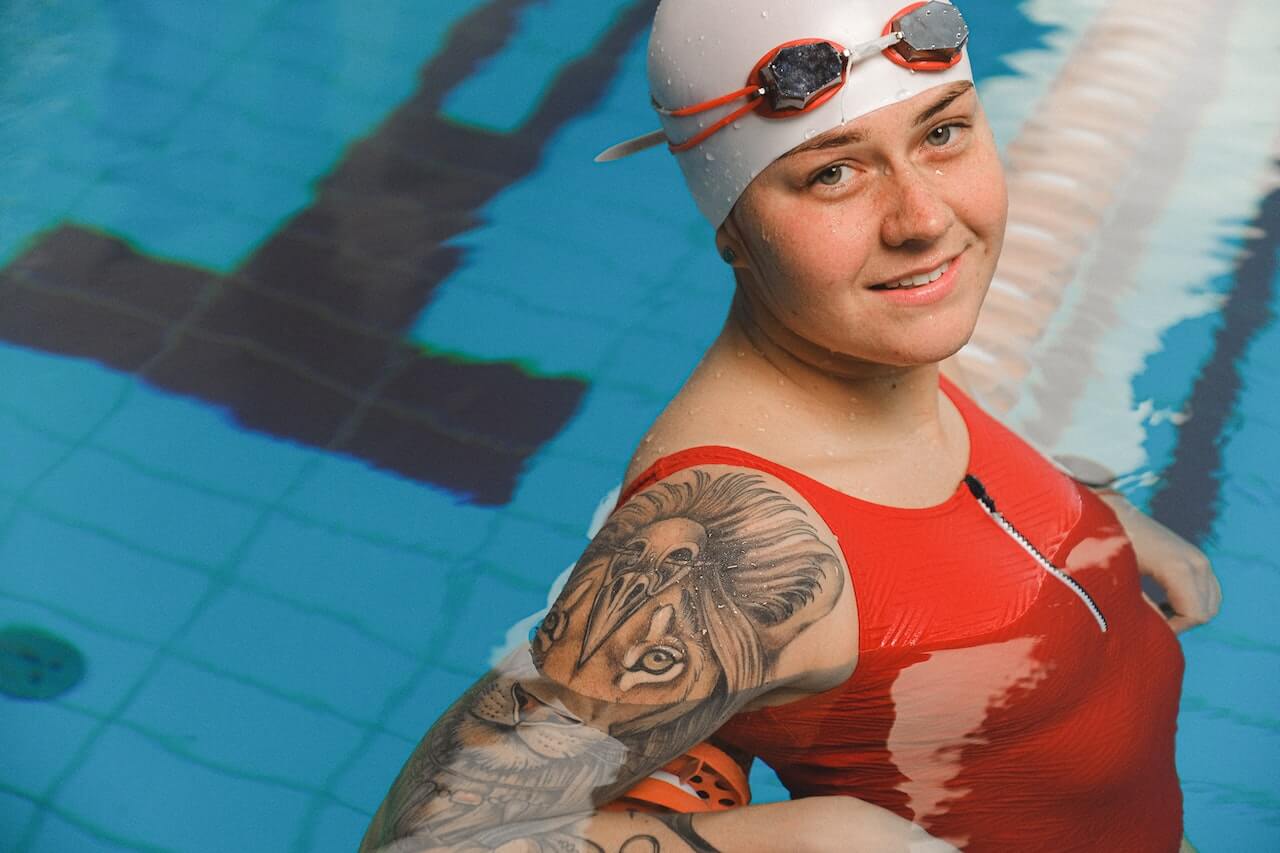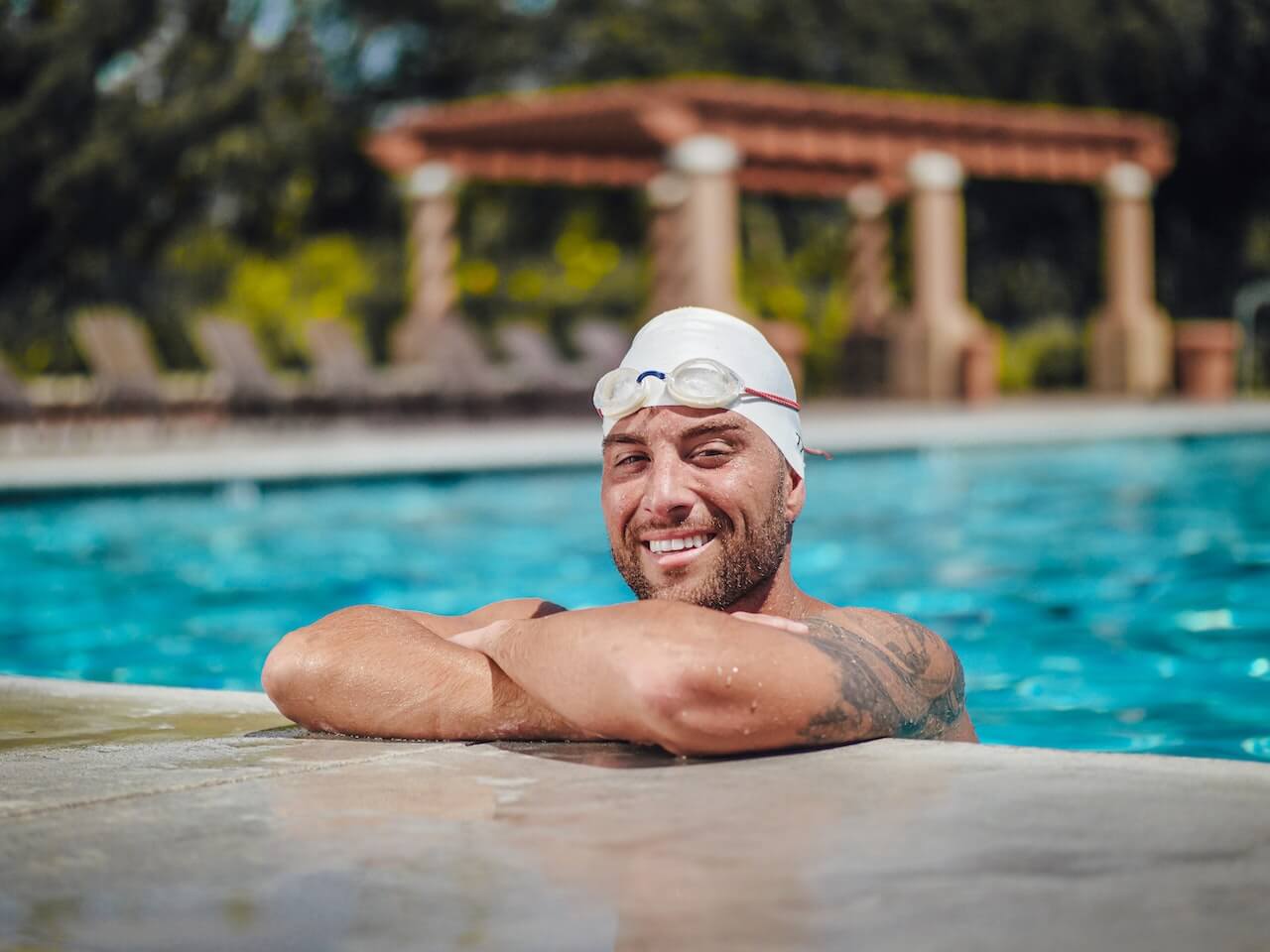So, you’ve just gotten a fresh, new tattoo and can’t wait to show it off at the beach or pool. But have you ever wondered how long you should wait before taking the plunge?

You should give your tattoo wound enough time to fully heal, which generally takes 2 to 4 weeks, although some may take longer. The healing process for a tattoo can vary depending on factors such as size, location, and aftercare diligence. In some cases, it can take up to 6 months for a tattoo to fully heal.
In this article, we’re going to discuss the importance of giving your tattoo proper healing time, and how long you should wait before swimming in any type of water.
The Tattoo Healing Process
Why Does the Healing Process Matter?
When you get a tattoo, your skin is essentially wounded. The healing process is crucial for the appearance and longevity of your tattoo, as well as your personal health.
Letting your tattoo fully heal prevents infections and other complications. By ensuring that your tattoo heals properly, you can be sure that your health is never jeopardized, and that the tattoo maintains its vibrant colors for years to come.
Stages of Tattoo Healing
The tattoo healing process usually takes place in three stages:
- Stage One: Inflammation and Oozing – During the first few days, you’ll notice some redness, swelling, and oozing from the tattoo. Keep the area clean and follow your tattoo artist’s aftercare instructions to prevent infection.
- Stage Two: Peeling – After about a week, the outer layer of skin will start to peel off. Do not pick or scratch at the scabs, as this could damage your tattoo and delay the healing process. Instead, gently wash your tattoo and apply a thin layer of unscented moisturizer.
- Stage Three: Deep Healing – During the final stage, your tattoo’s deeper layers of skin will continue to heal. Keep moisturizing and limit sun exposure until your tattoo is fully healed.
The duration of these stages may vary depending on factors like your skin type, tattoo size, and adherence to aftercare instructions. It generally takes 2 to 4 weeks for a tattoo to fully heal, but larger or more complex tattoos may take from six weeks to six months.
Signs Your Tattoo Is Healed Enough for Swimming
Not every tattoo is the same size and people heal at different rates, so there is a lot of variability. So how can you tell if your specific tattoo wound has healed?
Here are a few signs to look out for that indicate your tattoo has healed enough:
- No more scabs or peeling skin
- No redness or swelling
- The tattooed area feels smooth and itch-free
If your tattoo is small and there are no complications, this may only take 2-4 weeks’ time. Just to be safe, most tattoo artists would recommend waiting 6-8 weeks before heading into the water. Remember, patience is key to protect your tattoo and ensure its longevity.
How Water Affects Your Fresh Tattoo

The Science Behind the No-Swim Rule
Do you really have to wait up to a month or more after getting a tattoo before you can swim? You may wonder why this is necessary, but it all comes down to science and your body’s natural healing process.
A new tattoo is essentially an open wound, and exposing it to water increases the risk of infection and damage to the ink.
During the first few weeks, your skin is working hard to rebuild and regenerate itself. Water, especially chlorinated water in pools or bacteria-infested bodies of water like oceans and lakes, may disrupt this process. Excessive exposure to water can also cause the tattoo ink to fade or wash away.
Swimming and Diving: A Threat to Your Tattoo
Having a fresh tattoo and taking a dip in the swimming pool or the ocean might seem harmless, but it could jeopardize your tattoo’s appearance and your overall health.
Here are some potential threats you should be aware of:
- Chlorine: Pool water contains chlorine, a chemical used to kill bacteria and sanitize the water. Unfortunately, chlorine also acts as a skin irritant and can cause your tattoo to fade, itch, and become inflamed.
- Ocean water: While the salt content in ocean water might help with the healing process, it’s the bacteria and other microorganisms that pose a threat to your new tattoo. Infections are more likely if you swim in the ocean too soon after getting your tattoo.
- Infections: Submerging a fresh tattoo in any body of water (including lakes and rivers) can introduce bacteria and other harmful microorganisms to the area. This can lead to painful infections, which might require medical attention and damage the appearance of your tattoo.
To avoid these potential problems, you should wait for your tattoo to heal completely before swimming or diving.
Timing Is Everything: When Can I Swim After Getting a Tattoo?
Can You Swim Right After Getting a Tattoo?
No, you should not swim right after getting a new tattoo. Remember, a fresh tattoo is an open wound, and it’s essential to give your skin time to heal. Swimming in any kind of water right after getting tattooed can expose your skin to bacteria and irritants, potentially leading to infection and irritation. You also shouldn’t use hot tubs either.
Can You Swim with a Tattoo After 7-8 Days?
While your tattoo might look better after 7-8 days, it’s still not advisable to swim during this period. At this stage, your new tattoo is still healing, and the skin hasn’t completely sealed up yet. Therefore, it’s best to avoid swimming to prevent exposure to harmful elements in the water, such as bacteria or chemicals that could impact the healing process.
Can You Swim with a Tattoo After Two Weeks?
Waiting two weeks before swimming is cutting it really close even for a smaller tattoo. It’s possible that the wound has closed up and therefore bacteria won’t get in. For a larger tattoo, you should ideally wait at least 4 weeks, even better if you wait 6-8 weeks.
Essential Tattoo Aftercare: How to Speed Up the Healing Process

Your Tattoo Aftercare Kit: The Must-Haves
Before diving into how to care for your new tattoo, it’s important to have the right supplies on hand. Your tattoo aftercare kit should include the following items:
- A gentle, fragrance-free soap for cleaning your tattoo, such as mild soap or unscented baby soap
- An unscented, dye-free lotion or tattoo-specific aftercare cream for moisture and protection
- An over-the-counter ointment, like Aquaphor or Lubriderm, to use during the initial healing stages
- Soft, clean towels and paper towels for drying your tattoo and ensuring a clean healing environment
- A breathable, absorbent material to cover your tattoo, such as Saniderm or SecondSkin
Investing in quality aftercare products can help speed up the healing process and ensure the longevity of your tattoo.
Caring for Your Tattoo: A Step-by-Step Guide
Taking proper care of your new tattoo helps avoid complications and ensure proper healing. Here’s a step-by-step guide to help you through the process:
- Leave the initial bandage on for the recommended time: Your tattoo artist will probably have applied a bandage to your fresh tattoo. Keep it on for the timeframe they suggest, usually between 2 and 24 hours.
- Wash your hands before touching your tattoo: Always wash your hands thoroughly before touching or cleaning your tattoo to avoid introducing bacteria into the healing area.
- Gently clean your tattoo: Once the initial bandage is removed, gently wash your tattoo using mild soap and lukewarm water. Avoid using harsh soaps, scrubbing, or soaking your tattoo. Instead, use your fingertips to clean the area and remove any excess ink, blood, or ointment.
- Pat dry and let your tattoo air out: Use a soft towel or paper towel to gently pat your tattoo dry. Avoid rubbing or using a hairdryer. Let the tattoo air out for a few minutes before applying any ointment.
- Apply a thin layer of ointment: For the first few days, use a thin layer of ointment like Aquaphor or A&D ointment to help protect your tattoo and keep it moisturized. Make sure not to use too much, as this can suffocate your skin and slow down the healing process.
- Switch to a gentle, unscented lotion: After the first few days, switch to using a gentle, unscented lotion to keep your tattoo moisturized. Apply the lotion multiple times per day, as needed, avoiding soaking or over-moisturizing.
- Avoid swimming and excessive sun exposure: During the healing process, which generally takes about 2 to 4 weeks, it’s essential to avoid swimming and excessive sun exposure. Submerging your tattoo in water can introduce harmful bacteria, and sun exposure can cause fading and damage to the tattooed skin.
By following these aftercare steps, you can speed up your tattoo’s healing process and keep it looking vibrant for years to come.
Sources:
- https://www.healthline.com/health/body-modification/how-long-after-a-tattoo-can-you-swim
- https://www.healthline.com/health/tattoo-healing-process
- https://www.healthline.com/health/how-long-does-a-tattoo-take-to-heal
- https://www.byrdie.com/how-long-to-wait-after-new-tattoo-to-swim-3189444
- https://www.usms.org/fitness-and-training/articles-and-videos/articles/how-long-should-i-wait-to-swim-after-getting-a-tattoo
